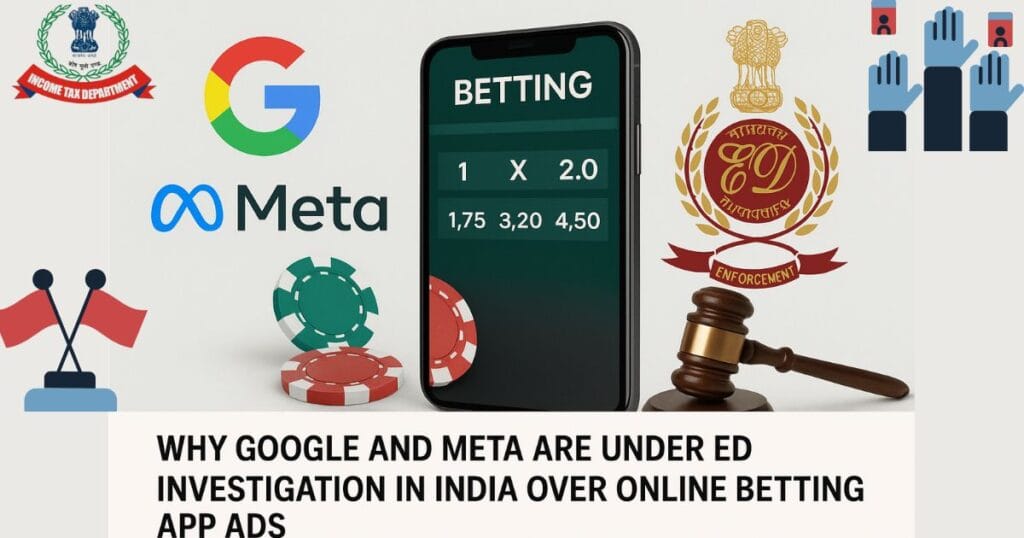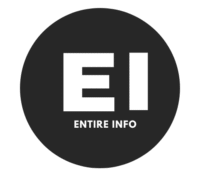Online gambling and betting have long stirred debate in India, but the controversy took a sharper turn recently as Google and Meta (Facebook’s parent company) came under the scanner. India’s Enforcement Directorate (ED) has accused these tech giants of promoting illegal online betting apps, indirectly enabling money laundering and gambling activities in the country.

What Triggered the ED’s Investigation?
The ED has summoned Google and Meta for questioning on July 21, 2025, in New Delhi under India’s stringent laws, including:
- PMLA (Prevention of Money Laundering Act): This law tackles cases where illegal money is moved around to make it appear legal, commonly known as money laundering.
- FEMA (Foreign Exchange Management Act): This deals with the violation of foreign exchange rules.
The ED alleges that these companies displayed advertisements for betting apps on their platforms, leading more users to engage with these apps and fueling illegal activities.
What is FEMA?
FEMA (Foreign Exchange Management Act (1999)) is a law of India, which was created in 1999 to control and manage foreign exchange and foreign transactions. It came into force from June 1, 2000, and it replaced the old law FERA (Foreign Exchange Regulation Act).
Under FEMA, all the rules related to foreign investment, foreign trade, and use of foreign exchange in India have been made so that the country’s economy remains strong and stable.
What is PMLA?
PMLA (Prevention of Money Laundering Act (2002)) is an Indian law that was made in 2002 to stop money laundering i.e. to convert black money into white. It came into force from 1 July 2005. Under this law, the government gets the right to take legal action against people involved in money laundering, confiscate property and punish the criminals.
Which Betting Apps Are in Question?
Several well-known apps have come under scrutiny.
- Mahadev Betting App: Tied to a ₹6,000 crore scam, with allegations of political bribery involving a former Chief Minister.
- Fairplay IPL Betting App: Popular for facilitating bets on IPL matches.
- Parimatch: An offshore betting platform aggressively operating in India.
What Do Indian Laws Say About Online Betting?
India does not have a single national law explicitly banning online betting. Instead, states have the authority to regulate it.
- States like Goa and Sikkim allow some forms of betting and casinos.
- States such as Tamil Nadu, Telangana, and Andhra Pradesh have completely banned online betting.
- Offshore platforms like Stake operate in a legal gray area, as they are not directly under Indian laws.
In states where betting is banned, participating in online gambling can result in fines or even imprisonment.
The legal framework under which Google and Facebook are being prosecuted
- PMLA: To prevent and investigate money laundering and hawala transactions.
- FEMA: To investigate violations related to foreign currency transactions.
- Consumer Protection Act, 2019: To prevent misleading advertisements.
- Guidelines for Prevention of Misleading Advertisements, 2022: To ban ads of illegal or misleading products and services.
- IPC Sections 318 and 319: Deal with fraud and unlawful property acquisition.
Has Google or Meta responded to this?
So far, neither Google nor Meta has made any public statement on the matter. Their stance may become clear after the ED inquiry, where their ad serving policies and content moderation practices will be examined to see if they comply with Indian laws.
What impact might this have on Facebook and Google users?
If the ED investigation leads to any strict rules, users may see the following.
- There will be fewer ads of betting apps on YouTube, Facebook and Instagram.
- Google and Meta may show ads as per Indian law.
- To avoid legal troubles, users will have to check the laws of their state before using any betting or gambling app.
This is not the first time such an incident has happened.
India has taken tough measures before.
- In 2024, the government blocked more than 1,410 illegal gaming websites.
- Celebrities such as Prakash Raj, Rana Daggubati and Vijay Deverakonda have faced questions for promoting betting apps.
- Zepto faced criticism for distributing promotional flyers for Parimatch.
These examples show the government’s determination to tighten control and security over online gambling and its promotion.
ED Official Website
What happens next?
If Google and Meta are found to be in violation.
- Google and Meta may face fines imposed by the government.
- Their advertising policies in India may be subjected to stricter monitoring.
- Other social media platforms and advertising networks may be subjected to stricter monitoring.
ALSO READ- Free Gemini AI Pro Plan: A Wonderful Gift from Google for Indian Students
Conclusion: Be Cautious About Online Betting
This case is a reminder of how complex the legalities are involved in online betting and its promotion in India. Before using any betting app, check your state’s laws to avoid unexpected legal problems.
For tech giants like Google and Meta, this investigation is a signal: complying with local laws is not optional, no matter how big your platform is. The outcome of this case is likely to shape the future of the online advertising and digital gaming industry in India.
Why is the ED investigating Google and Meta in India?
The Enforcement Directorate (ED) is investigating Google and Meta for allegedly promoting online betting apps on their platforms in India. These apps are linked to money laundering and illegal betting activities, and the ED suspects that by displaying their ads, Google and Meta indirectly enabled these unlawful activities.
Is online betting legal in India?
Online betting laws in India vary by state. Some states, such as Goa and Sikkim, allow certain types of betting, while states such as Tamil Nadu, Telangana and Andhra Pradesh have banned all forms of online betting. There is no single national law banning online betting, but in states where it is banned, participating in it can result in fines or imprisonment.
How will this investigation affect users on YouTube and Facebook?
If the investigation leads to stricter enforcement, users may see fewer ads for betting apps on platforms like YouTube, Facebook, and Instagram. Google and Meta may also update their advertising policies in India to comply with local laws, affecting the type of gaming or betting content shown to users.
Online trends can change fast, and staying updated helps you make better, safer choices. If you found this article helpful, share it with your friends so they understand the risks around online betting too.
Have thoughts on this issue or questions about online safety and tech laws in India? Drop your views in the comments below—we read every comment and reply personally.


